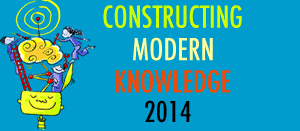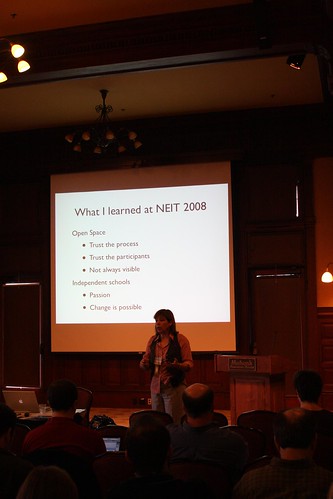This summer, I’m excited to once again be on the faculty of the Constructing Modern Knowledge summer institute.
If you are thinking of going, take advantage of Super Early-bird Registration -ends March 1st!
This is an environment in which educators can reacquaint themselves with the joy of learning while expanding their vision of the ways in which computers may be used and interact with some of the most powerful thinkers of our time.
 The four-day institute, July 13-16, dedicates a large chunk of time to learning by doing. Participants engage in personally meaningful projects that challenge their creativity and build upon the expertise of the community. The Constructing Modern Knowledge faculty is comprised of remarkable teachers who love learning and teaching.
The four-day institute, July 13-16, dedicates a large chunk of time to learning by doing. Participants engage in personally meaningful projects that challenge their creativity and build upon the expertise of the community. The Constructing Modern Knowledge faculty is comprised of remarkable teachers who love learning and teaching.
Last year’s projects included:
- Kinetic sculpture
- Videogame design
- Simulation building
- Robots that played musical instruments
- Puppets that roared
…and much more
Best of all, amazing connections were made between subject areas. Art teachers collaborated with mathematicians while kindergarten teachers shared her molecular models with an accomplished scientist. A good time was had by all!
Constructing Modern Knowledge 2009 will be held July 13-16, 2009 in Manchester, NH with an optional pre-conference science and history tour of Boston on July 12th.
Manchester is a small New England city with a great airport serviced by most major US airlines and terrific restaurants within walking distance of the institute site, The Radisson Hotel. There is a free airport shuttle and discounted hotel rates for participants. Manchester is also a convenient drive from most of New England and the Mid-Atlantic states.
Faculty:
Besides yours truly, the faculty includes Dr. Cynthia Solomon (one of the three people who invented Logo), John Stetson and legendary educator and author of more than 40 books on teaching and learning, Herbert Kohl. Gary Stager is the organizer and host.
Guest Speakers include:
Deborah Meier - a Macarthur Genius honored for her decades of service and innovation in urban public education. Ms. Meier is the “mother” of the small schools movement and her Central Park East in NYC and Mission Hill in Boston provide stunning examples of creative, compassionate, competent public education.
Lesa Snider King - one of the world’s leading experts on digital photography and imaging. She is such a great teacher that even I understand Photoshop while watching her perform her magic. Lesa just authored the new Photoshop CS4, the Missing Manual.
Peter Reynolds - the award-winning author, illustrator, animator, software developer and inspirer will host a CMK Reception at his famed FableVision Studios at the start of Wednesday night’s Night Out in the Big City (Boston)
Registration includes:
- Four-days of learning adventures
- Conference dinner
- Night Out in the Big City (Boston) beginning with a reception hosted by Peter Reynolds at the famed FableVision Studios
- Free creativity software from Tech4Learning, LCSI, Inspiration and FableVision
Hope to see you this July ! Super Early-bird Registration ends March 1st!
 I took a risk too, I didn’t prepare my keynote presentation until the night before. I felt I wanted to honor the process and trust that the experience of the conference would provide support for my topic of leadership vision to action, especially student leadership. And it did. I liked what I came up with, and the audience seemed to as well.
I took a risk too, I didn’t prepare my keynote presentation until the night before. I felt I wanted to honor the process and trust that the experience of the conference would provide support for my topic of leadership vision to action, especially student leadership. And it did. I liked what I came up with, and the audience seemed to as well.